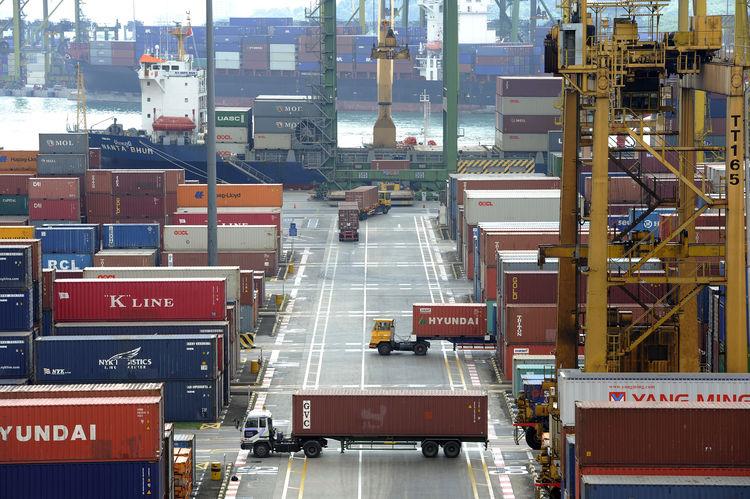- Nigeria’s Non-oil Exports and the Quest for Federalism
Ugochukwu Joseph Amasike writes that devolution of powers to the states would serve as a catalyst for the development of non-oil exports, restart Nigeria’s industrialisation-drive, create jobs and strengthen the economy as a whole.
The need to diversify Nigeria’s revenue base has continued to gain traction by the day, especially in light of recent economic challenges that were largely occasioned by over-dependence on oil and gas revenue. The drastic fall in oil prices in 2015 and the consequential foreign exchange crisis it triggered, reverberated across the entire spectrum of the Nigerian economy, resulting in job-losses, inflation, and untold hardship for Nigeria’s already beleaguered masses; and ultimately lead to Nigeria’s first economic recession in a quarter of a century. It is generally known that over 70% of government revenue comes from the oil and gas sector, this fact puts Nigeria in a precarious situation, especially in view of emerging global trends that is characterised by a shift away from traditional forms of fossil-fuel based energy, to alternative energy sources, thus under-scoring the critical need for Nigeria to rapidly diversify its revenue base.
It is pertinent to note that contrary to the general impression that the economy requires diversification, what is in fact required is the diversification of Nigeria’s sources of income, and the strengthening of the non-oil sectors of the economy.
This submission is highlighted by a 2016 World Bank report which revealed that the Nigerian oil and gas sector accounts for only eleven percent (11%) of Nigeria’s gross domestic product and employs less than three percent (3%) of Nigeria’s working population, yet disproportionately accounts for more than 90% of foreign exchange earnings. In light of this fact the need for a strategic alternative to oil and gas revenue cannot be over-emphasised. To this end there should be a conscious and deliberate effort on the part of the government to develop the non-oil export sector of the economy and to achieve this there is need to undertake institutional and regulatory reforms necessary to eliminate structures that impede the development of the economy and by extension the non-oil export sector.
It is suggested that incidental to these reforms is the amendment of the fiscal provisions of the 1999 Constitution and other subsidiary legislations, with a view to devolving economic power to the states, in order to encourage and enable their participation in the goal of diversifying the nation’s revenue base. The reality of the Nigerian situation is that the production activities of exporters occurs within the business landscape of the states, thus highlighting the importance of the states in the effort to diversify the nation’s revenue base and for the states to meaningfully contribute; they must do so as unhindered economic agents, not as incapacitated dependent appendages of the government at the centre.
The 1999 Constitution which was bequeathed to Nigeria by its erstwhile military dictators imposed on Nigeria a unitary system, which is today, dishonestly passed off as a federal system by some, in their desperate bid to maintain a status quo that feathers their nests.
The fiscal provisions of the Constitution which concentrates all economic power in the government at the centre is the chief obstacle to the sensible desire and drive to diversify Nigeria’s revenue base, because rather than leverage on the combined capacity of Nigeria’s 36 states, it shackles them and transforms them into dead-weight that hinders the nation’s quest for economic development.
It is noteworthy that Nigeria’s golden economic era in the 50’s and 60’s was largely non-oil export driven, with agro-industrial complexes across the then three nay four federating regions. The then regions, unrestrained by a suffocating unitary structure harnessed their respective comparative advantages, to finance and develop infrastructure, provide social services and aid the rapid growth of the national economy and concurrently facilitated the creation of a diversified revenue base for the nation. This state of affairs was made possible only as a result of the equitable and broad distribution of economic power to the regions by the Republican Constitution of 1963, which permitted the regions to exploit their resources, remitting fifty percent of all revenue generated from their respective region to the central government and retaining the remaining percentage for their upkeep.
However, today, Nigeria’s federating units are glorified appendages and outposts of the federal government, and are constantly locked in a desperate, never-ending struggle for the dwindling revenue generated from the oil and gas sector. If this unhealthy state of affairs is to change, then Nigeria must grow its non-oil exports, and if that is to be accomplished, then the current administration will have to implement its manifesto and as promised, “initiate action to amend our constitution with a view to devolving powers, duties and responsibilities to state and local governments in order to entrench true federalism and the federal spirit.”
The devolution of power to states would serve as a catalyst for the development of non-oil exports, restart Nigeria’s industrialisation-drive, create jobs, strengthen the economy, and expand the nation’s income streams, whilst engendering sustainable economic growth through greater exports and import-substitution, and simultaneously transforming Nigeria from a seemingly mono-product economy, to a full-fledged industrial economy.
It is prayed that Nigeria’s leadership will see the urgent need to take the ostensibly hard decision of devolving economic power to the states in order to deliver Nigeria from poverty and under-development and to usher in a new era of economic growth and prosperity for Nigeria and Nigerians.
– Amasike, a Lawyer, wrote from Abuja


 Forex3 weeks ago
Forex3 weeks ago
 Naira3 weeks ago
Naira3 weeks ago
 Billionaire Watch2 weeks ago
Billionaire Watch2 weeks ago


 Naira3 weeks ago
Naira3 weeks ago




 Naira2 weeks ago
Naira2 weeks ago




 Naira1 week ago
Naira1 week ago




 Naira4 weeks ago
Naira4 weeks ago
 Banking Sector4 weeks ago
Banking Sector4 weeks ago























